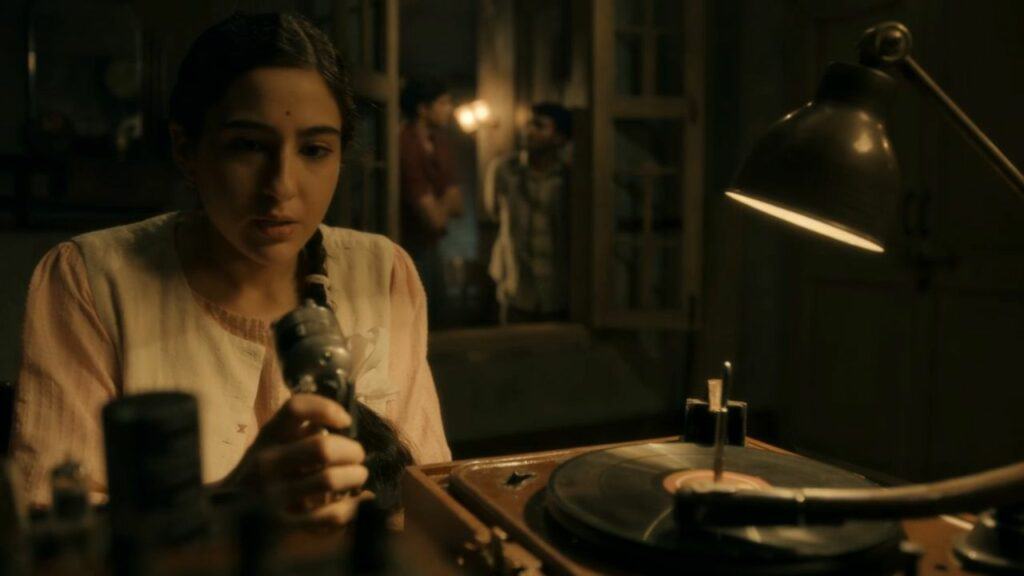In Ae Watan Mere Watan, a young girl named Usha Mehta, played by Sara Ali Khan, starts an underground radio station during the Quit India Movement.
Ae Watan Mere Watan tells the story of a freedom fighter whose legacy deserves to be remembered in history.
At a very young age, Usha witnessed the atrocities committed by the British colonizers and grew up despising their rule.
She dreamed of the day her country would attain freedom and govern itself. To make that dream a reality, she starts working with the Congress alongside her college friends.
When the Quit India Movement is announced and the Congress leaders are arrested, Usha decides to start an underground radio station called Congress Radio.
Her radio station becomes a means to convey the voices of the leaders to the masses and counter British propaganda.
Usha goes against her father’s wishes, leaves home, and risks her life to continue fighting for her country’s independence until she is caught and arrested.
The film ends with Usha’s release from prison and her reconciliation with her father, but there is much more to the life of the woman who inspired the film.
The life of an inspiring woman
As depicted in the film, Usha Mehta was inspired to fight for her country’s freedom at a young age.
She attended a camp arranged by Gandhi at the age of five and then participated in the protest against the Simon Commission when she was eight years old.
Initially, her father opposed her involvement in the freedom struggle, given his profession as a judge, but his retirement resolved any conflict on the matter.
In the early 1930s, her family moved to Bombay, where she continued to actively participate in the freedom movement.
Usha was deeply influenced by Gandhi and his ideology, leading her to take the vow of celibacy and adopt a Gandhian lifestyle devoid of luxuries.
After ranking among the top 25 students in her matriculation examinations, she pursued a degree in Philosophy and later decided to study law.
However, at the age of twenty-two, she decided to participate in the Quit India Movement and dedicate herself to the freedom movement.
After the arrest of prominent leaders, Usha and her friends started Congress Radio, which went on air on August 27, 1942.

Apart from broadcasting the messages of the leaders of the freedom movement, it aimed to disseminate uncensored news and other information prohibited by the government.
Ram Manohar Lohia, another key figure in the freedom movement, also became affiliated with Congress Radio, which provided a platform for the movement’s voice.
With the British suspending all amateur radio licenses during the Second World War, Usha and her associates were broadcasting illegally.
To evade arrest, the radio station’s location was changed frequently. Despite their efforts, Usha and the others were found and arrested in November 1942.
Following her arrest, she was interrogated for six months, but she never gave in. Even during her trial, she refused to answer questions.
In March 1946, Usha became the first political prisoner to be released in Bombay. However, her poor health prevented her from engaging in politics and social work.
She pursued a PhD from the University of Bombay and eventually became the head of the Department of Civics and Politics. She retired in 1980.
Her invaluable contribution to propagating Gandhian philosophy cannot be forgotten. In addition to penning articles, essays, and books, she served as the president of Gandhi Smarak Nidhi and was later active with the Gandhi Peace Foundation.
In 1998, she was honored with the Padma Vibhushan, India’s second-highest civilian award. Two years later, on August 11, 2000, at the age of eighty, she passed away.
Usha Mehta, survived by her elder brother and three nephews, is remembered today as the freedom fighter who started Congress Radio, thereby keeping the leaders of the freedom movement connected with the masses.

